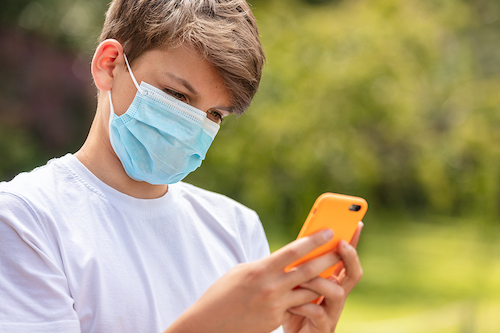 Just over a year since the COVID-19 pandemic began in the US, parents are reporting worsening mental health in their teenagers.
Just over a year since the COVID-19 pandemic began in the US, parents are reporting worsening mental health in their teenagers.
The CS Mott Children’s Hospital National Poll on Children’s Health at Michigan Medicine found that almost half of parents have noticed a worsening or new mental health condition in their teenagers since the start of the pandemic. Three in four say the pandemic has negatively impacted the social interactions of their teens.
“There has been significant concern expressed in many venues about the toll COVID-19 restrictions have had on teen mental health. Although serious illness from COVID-19 is uncommon among teens, the changes brought on by the pandemic have wreaked havoc on their lives,” Dr. Gary Freed, co-director of the poll and a Mott pediatrician told theravive.
The poll gathered responses from 977 parents of teenagers aged 13-18.
For teenagers, the past year of pandemic related restrictions has meant months on end of virtual home schooling, less time spent with friends and the cancellation of activities like prom, concerts and sports.
For teenagers who rely on social interactions for emotional support, these restrictions have had a significant impact on their mental health.
The poll found that one in three girls and one in five boys have experienced worsening or new anxiety since the pandemic began. Parents of girls were more likely to notice an increase in anxiety or worry compared with parents of boys. 36 percent of parents of teen girls noticed an increase in anxiety or worry compared with 19 percent of parents of teen boys. 31 percent of parents of teen girls noticed an increase in depression or sadness compared with 18 percent of parents of teen boys.
Parents are also reporting negative changes to the sleep habits of their teens. 24 percent of parents of teen girls reported a negative change to the sleep of their teen, as did 21 percent of parents of boys.
14 percent of parents of girls and 13 percent of parents of boys reported their teens were withdrawing from the family. Eight percent of parents of girls and nine percent of parents of boys reported aggressive behaviour in their teens.
Experts say teen depression during COVID-19 restrictions may be associated with a teenager’s own uncertainty and fear, as well as high parental stress. For some teens, isolation may trigger new problems with mental health, while for other the restrictions may be worsening existing mental health issues.
Parents cite the changes to social interaction as a key issue in their teens’ mental health. 64 percent of parents say their teens have been texting every day or almost every day. 56 percent reported the same for social media, 43 percent for social gaming and 35 percent for talking on the phone. Very few parents reported that their teens were getting together with others in person.
Experts say peer groups and interacting socially with peers is a crucial part of development during adolescence. The pandemic has limited such opportunities and teens as a result may feel anxious, frustrated or disconnected due to restrictions related to the pandemic.
Parents who responded to the poll reported they had tried different methods to help their teen, including relaxing rules related to the pandemic, relaxing rules concerning social media, seeking professional help and using mental health apps.
Half of parents have relaxed their rules surrounding social media use, and 70 percent say it has made a difference. One in four parents south the health of a mental health provider for their teen, with three quarters saying it helped. A third of parents also spoke with teachers or school counsellors and 57 percent said that was helpful.
“One of the most important things for parents to do is keep lines of communication open; ask their teen how they are doing and create the space for them to speak honestly so they can provide help when needed. Parents also need to remember it is normal for teens to crave privacy from their family. Giving them space for some quiet time, creative time or music time can be helpful to their mental health,” Freed told Theravive.
“Also, parents can help their teens craft a healthy and productive routine to their days and nights, including a regular sleep and wake time that fits with their online learning schedule and their interactions with peers and family.”
Elizabeth Pratt is a medical journalist and producer. Her work has appeared on Healthline, The Huffington Post, Fox News, The Australian Broadcasting Corporation, The Sydney Morning Herald, News.com.au, Escape, The Cusp and Skyscanner. You can read more of her articles here. Or learn more about Elizabeth and contact her via her LinkedIn and Twitter profiles.